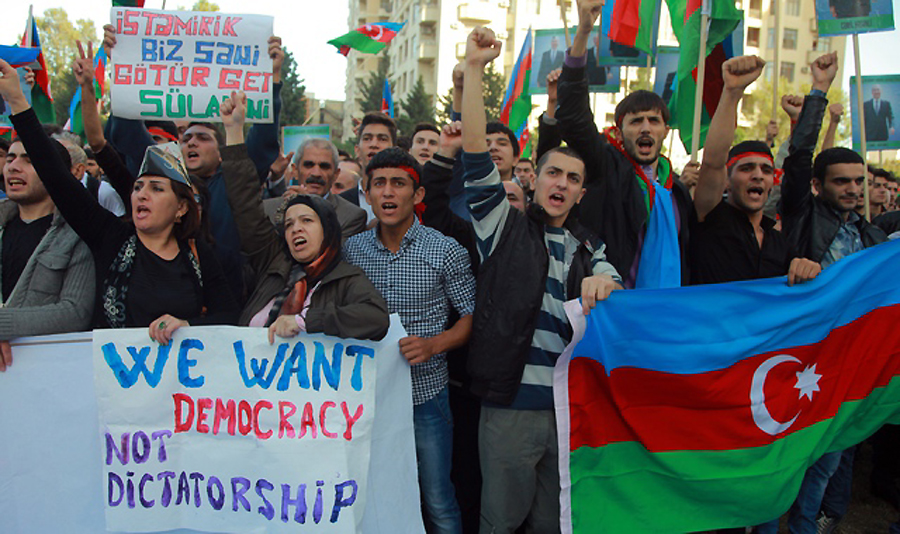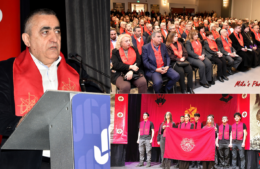Assassination attempt and protest send warning to Azerbaijan’s rulers
- (0)

With the economy heavily dependent on the energy sector and the wealth gap now huge, Azerbaijan’s leaders could face a growing challenge to retain power in the long term if oil prices fall.
(Reuters) – An assassination attempt and protest in Azerbaijan’s second city have sent a warning to the ruling elite that discontent is simmering in the tightly controlled, oil-producing state.
Police have arrested a local man over the attack in which Elmar Veliyev, mayor of the northwestern city of Gyanja, was shot and wounded in front of his office on July 3.
Interior Ministry officials say the suspect, Yunis Safarov, has ties to a militant group that wants to establish Islamist rule in Azerbaijan, a secular state where most people are Shi’ite Muslims, and that he trained with militants in Syria. They have cited no sources for the information.
But some Gyanja residents challenge the ministry’s version of events. They suggest Safarov was motivated by revenge for what they see as Veliyev’s mistreatment of Gyanja residents and disrespect for their religious views.
In a rare outbreak of violence against officialdom in the South Caucasus nation, two police officers were stabbed to death in clashes when a protest over Safarov’s arrest and unofficial reports that he was beaten in custody turned violent on July 10. A third, Samir Bayramov, was wounded.
Azerbaijan, a majority Muslim country of about 10 million, has grown wealthy from oil and natural gas since it declared independence from the Soviet Union in 1991. Protests are rare and are put down quickly.
But while money has flowed into sprucing up Baku, opponents of President Ilham Aliyev say few have seen major benefits from the oil wealth, especially people outside the capital, and accuse his government of suppressing human rights and stifling democracy.
Drawing parallels with Aliyev, they accuse Veliyev, 57, of treating Gyanja like a personal fief, showing no regard for the city’s poor and being high-handed with anyone who stands in his way.
“Veliyev has been behaving exactly the same way as Aliyev does,” Jakhangir Amirkhanly, a 74-year-old member of the opposition Musavat Party, told Reuters in Gyanja.
The unrest was brief and there is no sign of it spreading. Aliyev, who succeeded his father Heydar Aliyev as president in 2003, brooks little dissent and the opposition is weak.
The municipal authorities in Gyanja said in an emailed response to Reuters’ questions that criticism of Veliyev was “groundless and biased.”
But the events in the city show that, with the economy heavily dependent on the energy sector and the wealth gap now huge, Azerbaijan’s leaders could face a growing challenge to retain power in the long term if oil prices fall.
Deeply entrenched elites and long-term rulers in other countries in the region are watching closely — Kazakhstan, Russia and Turkmenistan all have economies that are reliant on energy and leaders who are nervous about any signs of unrest.
Europe is also watching. Because of its energy reserves and strategic location along the Caspian Sea, Azerbaijan is seen by Europe as an important alternative to Russian energy supplies, and BP (BP.L) is a major investor in the country.
“ACTS OF TERRORISM”
Aliyev has shown his concern by taking charge of the investigation into the events in Gyanja, which he has described as acts of terrorism and crimes against Azeri statehood aimed at intimidating society.
The authorities also showed their nervousness by trying to stop news of the protest spreading, city residents said. For two days afterwards, mobile telephone data services were turned off in Gyanja, making it hard to access social media, they said.
Some had used Facebook to circulate information about the events and the prosecutor’s office has opened criminal cases against the editors of four independent Azeri websites that re-posted their entries.
Gyanja, a city of 330,000, has been administered for seven years by Veliyev, a member of the ruling party who was appointed by Aliyev.
Police say four people accused of links to radical religious organizations were killed in sting operations after the assassination attempt and protest. In addition, 61 have been arrested and charged, and 13 others are wanted by police.
But of 11 Gyanja residents who agreed to speak to Reuters about the events, eight doubted the assassination attempt had any link to militant Islamists and said they believed Veliyev, who is a Muslim, was attacked because he was unpopular.
None wanted to be identified for fear of reprisals except Amirkhanly, though Azeri officials deny Western charges of repressing and intimidating opponents.
“We were shocked that someone dared to take a gun and shoot the mayor,” a pensioner said in a Gyanja park, lowering her voice and looking round to make sure no one was eavesdropping.
“But honestly, no one was particularly worried because Veliyev did a lot of bad things in our city … The rich became richer and the poor became beggars,” she said.
The city administration in Gyanja defended Veliyev’s record in office in response to Reuters’ questions.
“The attack … is just a terrorist act. It’s not connected to any particular motives, revenge or response to the supposed ‘social tyranny’ by Veliyev,” it said.
“Large-scale construction work has been carried out in the city. The authorities have had meetings with city residents, listened to their complaints and dealt with them effectively.”



















